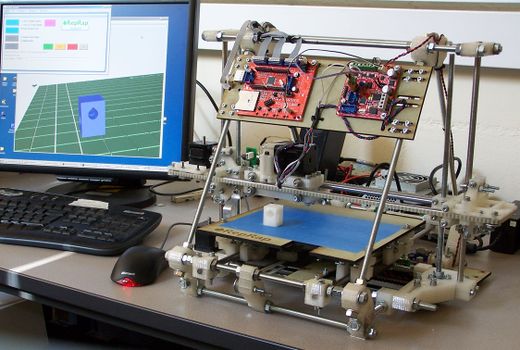The meeting is open to all, and if you'd like to attend please send an email to omfc-reprap-talk@lists.atuin.ninebynine.org so that we can have some advance idea of numbers attending.
I'll use this web page to post any new information about this talk.
What is RepRap?
The RepRap project aims to create a low-cost manufacturing system that is capable of making its own components from commonly available supplies.- RepRap is a desktop 3D printer, or rapid prototyper, capable of printing plastic objects.
- The RepRap designs are freely available, and one can be constructed currently for a materials cost of about £350.
- RepRap can make about half of its own parts (not counting nuts-and-bolts), and the remaining materials are stock items available from a number of sources.
More information about the RepRap project can be found at http://reprap.org/, or http://staff.bath.ac.uk/ensab/replicator/Downloads/one-page.pdf.
There's also an interesting commentary at: http://news.bbc.co.uk/1/hi/technology/10089419.stm.

(image from RepRap web site: http://reprap.org/mediawiki/images/thumb/1/1f/Mendel.jpg/520px-Mendel.jpg)
Why RepRap for aeromodellers?
Traditional home-build aeromodelling has been displaced in recent years by hi-tech mass manufacturing of ARTF kits, with a corresponding reduction of diversity and innovation in models seen on the flying field. The RepRap project puts hi-tech manufacturing capabilities back into the hands of club modellers, and could help to spur and sustain a new grass-roots innovation in model design and construction.Why aeromodellers for RepRap?
Aeromodellers (and other hobby modellers) are a long-standing community of "makers", who are used to building complex artifacts using a variety of technologies. As well as making good use of RepRap's capabilities, this is a community who may be motivated to create more RepRap's (in the spirit of http://reprap.org/wiki/PhilosophyPage). Further, aeromodellers are used to analyzing and adapting designs to make them better for their original purpose, or to apply them to different goals. It would be surprising if the creativity of modellers could not find many ways to improve or extend the RepRap designs.
